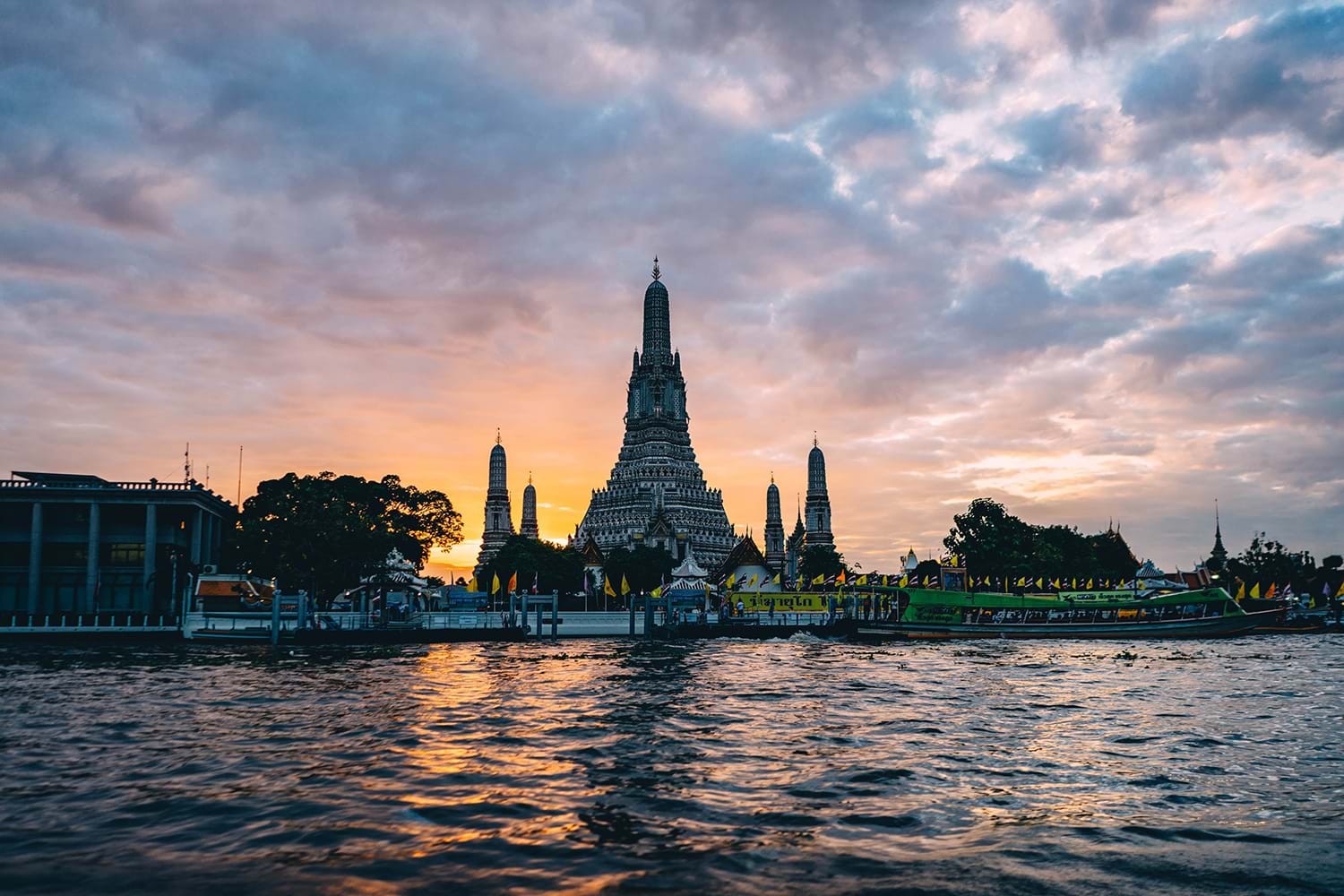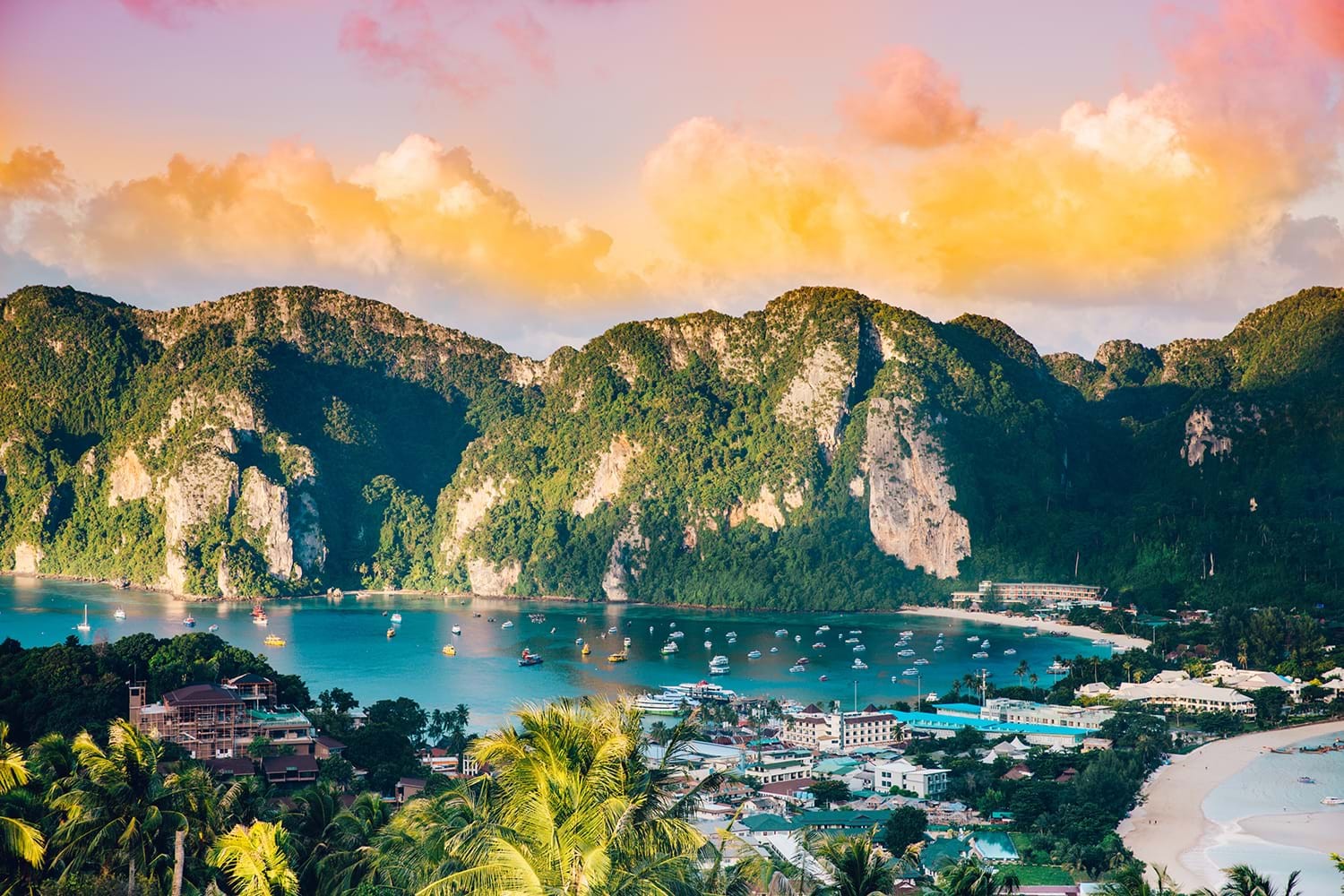Is Thailand Dangerous To Travel To? Yes, but with careful planning and awareness, Thailand remains a popular and generally safe destination for tourists. TRAVELS.EDU.VN offers expert guidance and resources to ensure a secure and enjoyable trip, covering everything from transportation and cultural sensitivities to health and safety precautions. By staying informed and prepared, travelers can confidently experience the beauty and excitement of Thailand. Prioritize your safety with travel advisories, local customs, and emergency contacts for peace of mind.
1. Understanding Safety Concerns in Thailand
Thailand, known for its stunning temples, vibrant street life, and beautiful beaches, attracts millions of tourists each year. However, like any popular travel destination, it’s essential to be aware of potential safety concerns. Understanding these risks and how to mitigate them can ensure a safer and more enjoyable trip. According to the Tourism Authority of Thailand (TAT), over 39 million tourists visited Thailand in 2019, highlighting its popularity. While most visits are trouble-free, being informed is crucial.
1.1. Common Tourist Scams
One of the primary concerns for tourists in Thailand is the prevalence of scams. These can range from minor annoyances to serious financial losses.
- Taxi and Tuk-Tuk Scams: Overcharging or taking circuitous routes is common. Always insist on using the meter or negotiate the fare beforehand.
- Gem Scams: Tourists are often lured into buying fake or overpriced gems. Avoid shops recommended by taxi or tuk-tuk drivers.
- Time-Share Scams: High-pressure sales tactics promising great deals on accommodations can lead to significant financial losses.
- ATM Skimming: Be cautious when using ATMs, especially in tourist areas. Check for any signs of tampering and cover the keypad when entering your PIN.
1.2. Petty Theft and Pickpocketing
Petty theft, including pickpocketing and bag snatching, is common in crowded areas such as markets, public transportation, and tourist hotspots.
- Markets: Keep your belongings close and be aware of your surroundings.
- Public Transportation: Avoid displaying valuables and keep your bags secure.
- Tourist Areas: Be extra vigilant in popular spots like Khao San Road in Bangkok or Patong Beach in Phuket.
1.3. Road Safety
Road safety is a significant concern in Thailand. The country has a high rate of traffic accidents.
- Motorbike Accidents: Many tourists rent motorbikes without proper experience or insurance. Always wear a helmet and drive defensively.
- Traffic Laws: Familiarize yourself with local traffic laws and regulations.
- Driving Conditions: Be aware of unpredictable driving behavior and road conditions.
1.4. Water Safety
Thailand’s beautiful beaches and islands can be deceptive. Drowning is a significant risk for tourists.
- Rip Currents: Be aware of rip currents, especially on beaches without lifeguards.
- Alcohol and Swimming: Avoid swimming after consuming alcohol.
- Boat Safety: Ensure that boats are properly equipped with life jackets and safety equipment.
1.5. Health Risks
Various health risks, including mosquito-borne diseases and food poisoning, can affect travelers.
- Dengue Fever and Zika Virus: Protect yourself from mosquito bites by using repellent and wearing long sleeves and pants.
- Food Safety: Eat at reputable restaurants and avoid street food from vendors with poor hygiene practices.
- Sun Exposure: Protect yourself from the strong tropical sun by wearing sunscreen, hats, and sunglasses.
2. Personal Safety Tips for a Secure Trip
Ensuring personal safety in Thailand involves a combination of awareness, preparation, and responsible behavior. By following these tips, travelers can significantly reduce their risk and enjoy a safer trip.
2.1. Stay Aware of Your Surroundings
Being aware of your surroundings is one of the most effective ways to prevent safety issues.
- Avoid Distractions: Put away your phone and pay attention to your surroundings.
- Trust Your Instincts: If a situation feels uncomfortable, remove yourself from it.
- Be Vigilant at Night: Avoid walking alone in poorly lit areas at night.
2.2. Secure Your Belongings
Protecting your belongings is crucial to prevent theft.
- Use a Money Belt: Keep your passport, credit cards, and cash in a secure money belt.
- Secure Your Bags: Use bags with secure closures and keep them close to your body.
- Avoid Displaying Valuables: Do not flaunt expensive jewelry, watches, or electronics.
2.3. Transportation Safety
Safe transportation practices are essential for getting around Thailand.
- Use Reputable Taxi Services: Opt for metered taxis or ride-hailing apps like Grab.
- Negotiate Tuk-Tuk Fares: Always agree on the price before starting your journey.
- Wear a Helmet: If renting a motorbike, always wear a helmet.
- Avoid Driving Under the Influence: Never drive after consuming alcohol.
2.4. Health Precautions
Taking health precautions can help you stay healthy during your trip.
- Drink Bottled Water: Avoid drinking tap water and stick to bottled water.
- Eat at Reputable Restaurants: Choose restaurants with good reviews and hygiene practices.
- Use Mosquito Repellent: Apply mosquito repellent regularly, especially during dawn and dusk.
- Get Vaccinations: Consult your doctor about necessary vaccinations before traveling.
2.5. Respect Local Customs
Respecting local customs and traditions is essential for avoiding misunderstandings and potential conflicts.
- Dress Modestly: When visiting temples, dress modestly, covering your shoulders and knees.
- Remove Your Shoes: Take off your shoes before entering temples and some homes.
- Avoid Public Displays of Affection: Refrain from excessive public displays of affection.
- Be Respectful of the Monarchy: Avoid making negative comments about the royal family.
 Golden Buddha statue in a temple
Golden Buddha statue in a temple
2.6. Emergency Contacts
Having emergency contacts readily available can be invaluable in case of an incident.
- U.S. Embassy in Bangkok: +66 2 205 4000
- Tourist Police: 1155
- Medical Emergency: 1669
3. Specific Safety Concerns and How to Address Them
Addressing specific safety concerns requires targeted strategies and awareness. This section provides detailed advice on how to handle common risks in Thailand.
3.1. Dealing with Tourist Scams
Avoiding tourist scams involves vigilance and informed decision-making.
- Research Common Scams: Familiarize yourself with common scams before your trip.
- Be Wary of Unsolicited Offers: Be cautious of people who approach you with unsolicited offers or advice.
- Verify Information: Always verify information before making a purchase or agreeing to a service.
- Report Scams: Report any scams to the tourist police.
3.2. Protecting Yourself from Petty Theft
Preventing petty theft requires proactive measures and awareness.
- Use Secure Bags: Opt for bags with anti-theft features, such as hidden zippers and reinforced straps.
- Keep Bags in Sight: Never leave your bags unattended, especially in public places.
- Avoid Overcrowded Areas: Be extra cautious in crowded areas where pickpockets operate.
- Use Hotel Safes: Store valuables in a hotel safe when not in use.
3.3. Safe Motorbike Riding
Safe motorbike riding requires proper training, equipment, and awareness.
- Get Proper Training: If you’re not an experienced rider, take a motorbike safety course.
- Wear a Helmet: Always wear a helmet that meets safety standards.
- Check the Bike: Inspect the motorbike for any mechanical issues before renting.
- Drive Defensively: Be aware of other drivers and road conditions.
3.4. Avoiding Water-Related Accidents
Preventing water-related accidents requires awareness of risks and responsible behavior.
- Swim in Designated Areas: Stick to swimming in areas with lifeguards.
- Check Water Conditions: Be aware of rip currents and other hazards.
- Avoid Swimming Alone: Never swim alone, especially in unfamiliar waters.
- Supervise Children: Always supervise children closely when they are near water.
3.5. Staying Healthy
Maintaining your health during your trip involves preventive measures and awareness.
- Stay Hydrated: Drink plenty of water to avoid dehydration.
- Avoid Street Food from Unhygienic Vendors: Choose street food vendors with clean and sanitary practices.
- Wash Your Hands Regularly: Wash your hands frequently with soap and water.
- Carry a First-Aid Kit: Pack a basic first-aid kit with essentials like bandages, antiseptic wipes, and pain relievers.
4. Utilizing Resources for a Safe Trip
Several resources can help travelers stay safe and informed during their trip to Thailand.
4.1. Travel Advisories
Travel advisories provide up-to-date information on potential risks and safety concerns in specific countries.
- U.S. Department of State: Check the U.S. Department of State’s website for travel advisories and alerts.
- Government Websites: Consult the websites of your home country’s government for travel information.
4.2. Registration Programs
Registration programs allow travelers to register their trip with their embassy or consulate.
- STEP Program: The Smart Traveler Enrollment Program (STEP) allows U.S. citizens to register their trip with the U.S. Embassy.
- Benefits of Registration: Registration can help the embassy contact you in case of an emergency.
4.3. Travel Insurance
Travel insurance can provide financial protection and peace of mind in case of unexpected events.
- Coverage: Look for a policy that covers medical expenses, trip cancellation, and lost or stolen belongings.
- Emergency Assistance: Ensure that your policy includes 24/7 emergency assistance.
4.4. Local Resources
Utilizing local resources can provide valuable information and assistance during your trip.
- Tourist Police: The Tourist Police can assist with scams, theft, and other issues.
- Tourist Information Centers: Tourist information centers can provide maps, information, and assistance.
5. Safety Tips for Specific Destinations in Thailand
While Thailand is generally safe, certain destinations may have unique safety concerns.
5.1. Bangkok
Bangkok, the capital city, is known for its vibrant nightlife and bustling streets.
- Taxi Scams: Be wary of taxi drivers who refuse to use the meter.
- Pickpocketing: Be extra vigilant in crowded areas like markets and public transportation.
- Traffic: Be cautious when crossing streets and avoid driving during rush hour.
5.2. Phuket
Phuket, a popular island destination, is known for its beautiful beaches and nightlife.
- Water Safety: Be aware of rip currents and swim in designated areas.
- Motorbike Accidents: Avoid renting motorbikes if you are not an experienced rider.
- Theft: Secure your belongings and avoid walking alone at night.
5.3. Chiang Mai
Chiang Mai, located in northern Thailand, is known for its temples and relaxed atmosphere.
- Air Quality: Be aware of air pollution, especially during the burning season (February-April).
- Traffic: Be cautious when driving or riding a motorbike.
- Scams: Be wary of unsolicited offers and verify information before making a purchase.
 View of Chiang Mai city from a temple
View of Chiang Mai city from a temple
5.4. Koh Samui
Koh Samui, another popular island, is known for its beaches and resorts.
- Water Safety: Be aware of rip currents and swim in designated areas.
- Motorbike Accidents: Avoid renting motorbikes if you are not an experienced rider.
- Theft: Secure your belongings and avoid walking alone at night.
6. Addressing Concerns for Solo Female Travelers
Solo female travelers may have unique safety concerns. Here are some tips to stay safe:
6.1. Accommodation
Choose safe and reputable accommodations.
- Read Reviews: Check reviews from other female travelers.
- Choose Central Locations: Opt for accommodations in well-lit and busy areas.
- Secure Your Room: Use the door lock and chain when inside your room.
6.2. Transportation
Use safe transportation options.
- Reputable Taxi Services: Opt for metered taxis or ride-hailing apps like Grab.
- Avoid Walking Alone at Night: If possible, avoid walking alone at night.
- Share Your Location: Share your location with a trusted friend or family member.
6.3. Social Interactions
Be cautious when interacting with strangers.
- Trust Your Instincts: If a situation feels uncomfortable, remove yourself from it.
- Avoid Over-Sharing: Be cautious about sharing personal information with strangers.
- Limit Alcohol Consumption: Be aware of your alcohol consumption and avoid getting intoxicated.
6.4. Dress Code
Dress modestly to avoid unwanted attention.
- Cover Shoulders and Knees: When visiting temples, dress modestly, covering your shoulders and knees.
- Avoid Revealing Clothing: Avoid wearing revealing clothing, especially in conservative areas.
7. How TRAVELS.EDU.VN Can Help Ensure a Safe Trip
TRAVELS.EDU.VN is dedicated to providing travelers with the resources and support they need for a safe and enjoyable trip to Thailand. We offer a range of services to help you plan and prepare for your adventure.
7.1. Expert Travel Advice
Our team of travel experts provides up-to-date information and advice on safety, health, and cultural customs in Thailand.
- Safety Tips: We offer detailed safety tips for various destinations and activities in Thailand.
- Cultural Insights: We provide insights into Thai culture and customs to help you avoid misunderstandings.
7.2. Customized Itineraries
We create customized itineraries tailored to your interests and preferences, ensuring a safe and enjoyable travel experience.
- Safe Accommodations: We recommend safe and reputable accommodations.
- Reliable Transportation: We arrange reliable transportation options, including private transfers and reputable taxi services.
7.3. 24/7 Support
Our 24/7 support team is available to assist you with any issues or emergencies during your trip.
- Emergency Assistance: We provide emergency assistance in case of medical emergencies, theft, or other incidents.
- Local Contacts: We offer a list of local contacts, including the U.S. Embassy and Tourist Police.
7.4. Travel Insurance
We offer comprehensive travel insurance plans to protect you against unexpected events.
- Medical Coverage: Our policies cover medical expenses, including hospital stays and doctor visits.
- Trip Cancellation: Our policies cover trip cancellation due to illness, injury, or other unforeseen circumstances.
- Lost Belongings: Our policies cover lost or stolen belongings.
8. Practical Checklist for a Safe Trip to Thailand
Before embarking on your trip to Thailand, use this practical checklist to ensure you’re fully prepared:
- Research Common Scams: Familiarize yourself with common scams and how to avoid them.
- Secure Your Belongings: Use a money belt and secure your bags.
- Get Vaccinations: Consult your doctor about necessary vaccinations.
- Purchase Travel Insurance: Buy a comprehensive travel insurance policy.
- Register with STEP: Register your trip with the U.S. Embassy.
- Pack a First-Aid Kit: Pack a basic first-aid kit with essentials.
- Learn Basic Thai Phrases: Learn a few basic Thai phrases to help you communicate.
- Download Useful Apps: Download apps for transportation, translation, and emergency assistance.
- Make Copies of Important Documents: Make copies of your passport, visa, and other important documents.
- Share Your Itinerary: Share your itinerary with a trusted friend or family member.
9. Addressing Specific Concerns: Political Stability and Safety
While Thailand is generally safe for tourists, it’s important to be aware of the political situation and any potential safety concerns related to political instability.
9.1. Staying Informed About Political Developments
Keep up-to-date with the latest news and political developments in Thailand.
- Reliable News Sources: Follow reputable news sources for accurate information.
- Government Travel Advisories: Monitor government travel advisories for any safety alerts or warnings.
9.2. Avoiding Political Protests and Demonstrations
Avoid areas where political protests or demonstrations are taking place.
- Monitor Local News: Stay informed about planned protests or demonstrations.
- Avoid Crowded Areas: Be cautious in crowded areas where protests may occur.
- Follow Local Authority Instructions: Follow instructions from local authorities in case of unrest.
9.3. Understanding Thailand’s Laws and Regulations
Be aware of Thailand’s laws and regulations to avoid legal issues.
- Respect Local Laws: Respect local laws and customs, even if they differ from your own.
- Be Mindful of Cultural Sensitivities: Be mindful of cultural sensitivities and avoid behavior that could be considered disrespectful.
- Avoid Illegal Activities: Avoid engaging in illegal activities, such as drug use or theft.
10. FAQ: Is Thailand Dangerous To Travel To?
1. Is Thailand safe for tourists?
Yes, Thailand is generally safe for tourists who take the necessary precautions and stay informed about potential risks.
2. What are the most common scams in Thailand?
Common scams include taxi scams, gem scams, and time-share scams. Be vigilant and verify information before making any purchases.
3. Is it safe to drink tap water in Thailand?
No, it is not safe to drink tap water in Thailand. Stick to bottled water or purified water.
4. How can I protect myself from mosquito bites in Thailand?
Use mosquito repellent regularly, wear long sleeves and pants, and stay in accommodations with mosquito nets.
5. Is it safe to rent a motorbike in Thailand?
Renting a motorbike can be dangerous if you are not an experienced rider. Always wear a helmet and drive defensively.
6. What should I do if I am robbed in Thailand?
Report the theft to the Tourist Police and your embassy or consulate.
7. Is it safe to travel alone as a woman in Thailand?
Yes, but solo female travelers should take extra precautions, such as choosing safe accommodations and avoiding walking alone at night.
8. What should I do if I encounter a political protest in Thailand?
Avoid the area and follow instructions from local authorities.
9. Is it necessary to purchase travel insurance for a trip to Thailand?
Yes, travel insurance is highly recommended to protect you against unexpected events, such as medical emergencies or trip cancellations.
10. How can TRAVELS.EDU.VN help ensure a safe trip to Thailand?
TRAVELS.EDU.VN provides expert travel advice, customized itineraries, 24/7 support, and comprehensive travel insurance plans to help you plan a safe and enjoyable trip.
Thailand offers an incredible travel experience with its rich culture, stunning landscapes, and delicious cuisine. While it’s essential to be aware of potential risks, with the right preparation and precautions, you can enjoy a safe and memorable trip.
Ready to explore the beauty of Thailand with peace of mind? Contact TRAVELS.EDU.VN today at 123 Main St, Napa, CA 94559, United States or call us on Whatsapp at +1 (707) 257-5400 for personalized travel advice and to book your safe and unforgettable Thailand adventure. Visit our website at travels.edu.vn to learn more. Let us help you create the perfect travel experience, ensuring your safety and enjoyment every step of the way.
